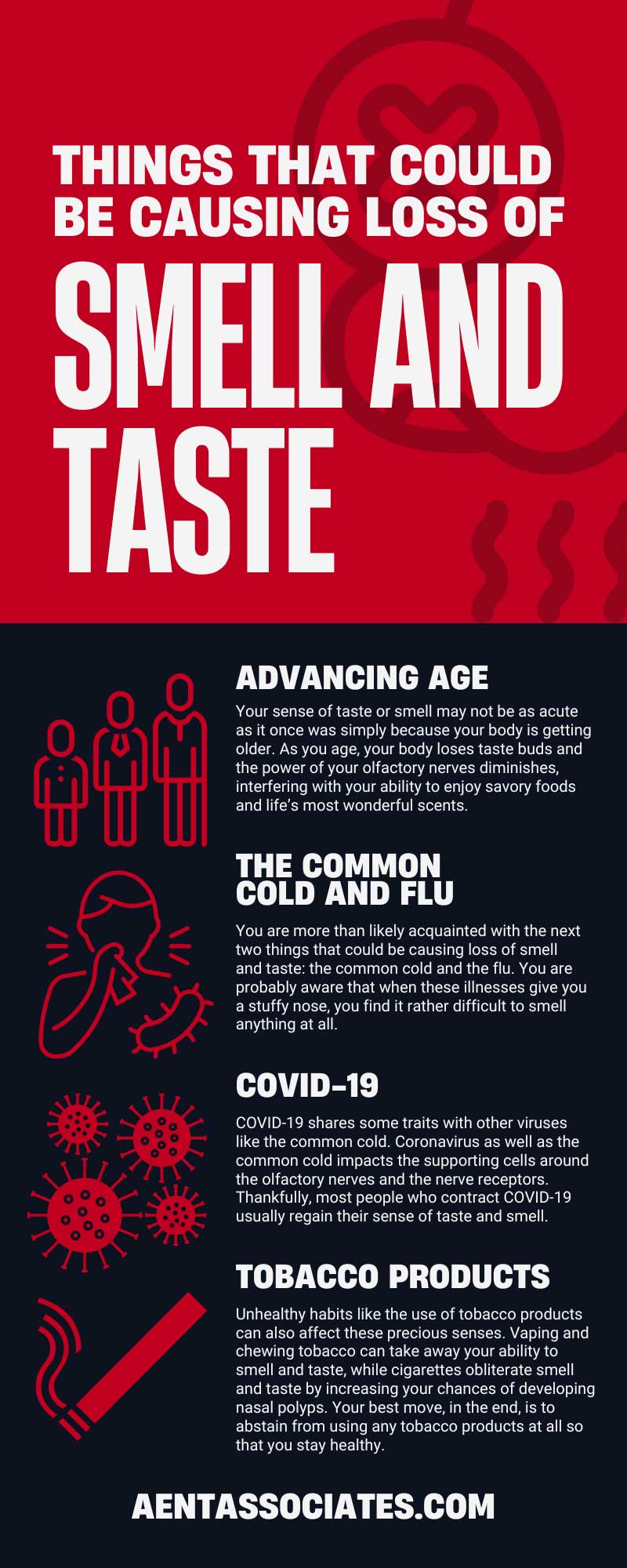If you suddenly lose your ability to smell aromas and taste your favorite foods, you might immediately think you are among the masses who unfortunately have caught COVID-19. Since the world is still in a long, grueling pandemic, you would have every right to think so, but your discomfort may stem from a host of causes. In fact, at least ten things could be causing your loss of smell and taste.
Advancing Age
Your sense of taste or smell may not be as acute as it once was simply because your body is getting older. As you age, your body loses taste buds and the power of your olfactory nerves diminishes, interfering with your ability to enjoy savory foods and life’s most wonderful scents.
Even if you think age is the cause, it’s wise to tell your physician about these symptoms. You should do so just in case your doctor can determine whether it is the sign of something more serious or if they can help you make changes to help you regain your senses.
The Common Cold and Flu
You are more than likely acquainted with the next two things that could be causing loss of smell and taste: the common cold and the flu. You are probably aware that when these illnesses give you a stuffy nose, you find it rather difficult to smell anything at all.
But you might not be aware of how these affect your sense of taste. Because the scents from the foods you eat are not making their way to your nose, you will enjoy your meal far less than you would normally. These can make the process of eating a far less pleasurable experience, but after you visit a Houston ENT and allergy clinic, you should be on the path to enjoying them again just as much as you did before.
COVID-19
COVID-19 shares some traits with other viruses like the common cold. Coronavirus as well as the common cold impacts the supporting cells around the olfactory nerves and the nerve receptors. Thankfully, most people who contract COVID-19 usually regain their sense of taste and smell.
However, the length of recovery can vary with patients. Many patients are able to taste and smell a few weeks after the virus leaves the body. But it can take longer for others to enjoy these simple pleasures again.
Eating Habits
What you put into your body can impact your senses as well. When some people lose their sense of smell and taste, it may indicate that they have a vitamin deficiency. For example, you may need to consume more zinc, which is important to your immune system. Zinc deficiency may result not only in compromised immunity but in smell and taste disturbances as well.
Tobacco Products
Unhealthy habits like the use of tobacco products can also affect these precious senses. Vaping and chewing tobacco can take away your ability to smell and taste, while cigarettes obliterate smell and taste by increasing your chances of developing nasal polyps. Your best move, in the end, is to abstain from using any tobacco products at all so that you stay healthy.
Dangerous Chemicals and Drugs
Exposure to dangerous chemicals or drugs can have a negative impact as well. If people unsafely expose themselves to insecticides and paint solvents, they may permanently hurt the cells that allow their brains to categorize odors and flavors. The use of cocaine can have a similar effect as well.
Medications
Following your doctor’s orders is the first line of defense when you are ill, but keep in mind that particular medications can affect your senses of smell and taste. Patients have found that certain prescribed antibiotics, blood-pressure medications, and antihistamines have diminished their ability to taste and smell.
Although your first instinct may be to stop taking the medication that you suspect is affecting your senses, it’s a much wiser idea to act cautiously. Instead of playing armchair doctor and doing anything rash, you should meet with your physician. They may prescribe you an alternate medication that keeps you healthy but doesn’t affect your senses.
Nasal Obstructions
Although you may consider a stuffy nose to be a nasal obstruction, true physical obstructions prevent your odor and taste receptors from sending messages to the brain—sometimes permanently if they problem is not addressed. Nasal polyps and a deviated septum can cause these problems, as well as a traumatic head or brain injury. Again, it is best to consult your doctor when dealing with these symptoms.
Cancer
The loss of taste and smell are sometimes the signs of cancer. Those with specific tumors in the head and neck area can experience these symptoms, but cancer treatment can also produce these effects on the patient.
Patients who undergo radiation to the head and neck area, chemotherapy, or targeted therapy, or who take medications for side effects can experience these symptoms. However, they also can experience an increased sense of smell for certain odors, a bitter taste in the mouth, or the perception that their food tastes saltier or sweeter than normal. These symptoms usually will go away after the patients finish their treatment.
Neurological Disorders
Patients with neurodegenerative disorders can also suffer these a loss of taste or smell. If a person cannot smell a scent or identify a certain flavor, it could be an early sign that they may suffer from Alzheimer’s disease or Parkinson’s disease in the future.
The loss of smell also has been linked with multiple sclerosis (MS), which wreaks havoc on a patient’s central nervous system. The symptom can indicate that the disease is advancing.
Although you may think you can easily diagnose what is causing your loss of taste and smell, it is best to go for a check-up with a professional to get the correct diagnosis. With this approach, you can get a trusted opinion that makes you feel confident about treating the loss of your senses. Going this route will put you on the right road to recovery.



